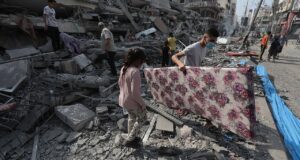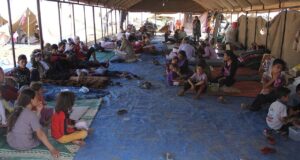By Julie Lenarz and Simon Schofield.
22nd August 2013, Human Rights and Conflict Resolution, Issue 3, No. 7.
Just six weeks after the overthrow of Mohamed Morsi’s government, Egypt finds itself on the precipice of civil war and complete meltdown.
The military’s overthrow of the Muslim Brotherhood was legitimate and could never have taken place without the massive popular mobilisation on June 30th, 2013, which clearly demonstrated the public’s complete dissatisfaction with the President and his consortium.
Whilst the Muslim Brotherhood was democratically elected, its rule was inherently undemocratic. Their contempt for the essential institutions of liberal democracy, which exist to constrain executive power and prevent the spectre of totalitarianism from rearing its ugly head, ran deep. Many will vividly recall that Mohammed El Baradei, one of the few prominent moderate voices in Egypt’s polity, commented that Morsi’s reforms amounted to him crowning himself ‘Egypt’s New Pharaoh’.
The President’s November decree disabled democratic processes and paved the way towards a fundamentalist Islamic state. Under the new declaration, the Constitutional Court no longer had the right to challenge the President’s decisions, while Morsi granted himself extensive powers to take ‘due measures and steps’ to deal with any threat to the revolution, which is darkly reminiscent of Iran and Libya’s Revolutionary Guards.
On top of that, the economy was on the brink of total collapse. Confidence in Morsi’s rule was so poor that government bonds saw the largest drop in recorded history falling twelve points in the year he was ruler. Law and order decayed to little more than an idea in many of the large urban centres. A terrorist, responsible for Egypt’s worst-ever atrocity which killed more than 60 tourists in Luxor in 1997, was appointed as governor and in one year of Morsi’s presidency, more journalists were prosecuted than in 185 years of the Egyptian press. In addition, social and public services were inadequate or not delivered at all, and ethnic and religious minorities were brutally persecuted.
That said, it cannot be dismissed that the Muslim Brotherhood won an election and represents roughly one quarter of Egyptians, a significant proportion of the overall population. In other words, the Muslim Brotherhood is a political reality which can neither be entirely ignored nor suppressed.
In a worrying development, the army now tries to illegitimately consolidate power for itself. Military rule must be a strictly temporary measure to facilitate fair and democratic elections and transfer power to civilian government as soon as possible. The Tamarod, the main opposition rebel group, in no way advocated a return to Mubarak-style military dictatorship when they went back onto the streets in support of Morsi’s overthrow.
In addition, the army’s plan to ban the Muslim Brotherhood is both illiberal and ineffective. Nasser, Sadat and Mubarak all tried to suppress the Brotherhood and miserably failed. Their religious fascism must be openly challenged and destroyed. Not only will driving them underground legitimate them as an anti-establishment force and make them martyrs of free speech, but most likely it will also lead to a further radicalisation of the conflict. Consequently, the army’s current approach towards Morsi’s supporters is self-defeating and a much more nuanced policy is required to bring stability into the chaotic situation.
The current level of violence in the country is unacceptable and the killing on both sides must be wholeheartedly condemned.
It goes without saying that the army has carried out a brutal crackdown using hugely disproportionate violence to silence the opposition. The military should go after Muslim Brotherhood leaders, who incite violence against minorities, not civilian protesters exercising their elementary right of free speech.
The Muslim Brotherhood is doubtless to blame for some of the deaths, due to their taking pages out of the Hamas playbook and intentionally using civilians as human shields. The Brotherhood are utilising a duplicitous strategy of simultaneously declaring they are willing to die as martyrs for their cause, carrying out whatever violence is ‘necessary’, and then decrying the deaths of their members when they are subsequently killed.
Furthermore, a large number of the Brotherhood faithful have taken part in a whirlwind of brutality against various minorities. Violence against the Copts has exploded. 47 Christian churches and monasteries have been burned, robbed and attacked since August, 14th. Islamists have even used red graffiti to mark Christian homes and shops in Egypt, following the Nazis’ Holocaust-era practice used to identify legitimate targets.
Egypt is at a crossroads at present. It is important to note two things: firstly, the Egyptian deadlock cannot be solved with bullets. A political solution is the only viable option. Secondly, liberalism cannot reside in a theocratic tyranny envisioned by the Muslim Brothers. But neither can it exist in a Pakistani-style military-run pseudo-democracy. Depending on which players come out on top of the current conflict, there are five different potential outcomes.
First of all and perhaps, thankfully, less likely than some of the other outcomes, Egypt could slide further down the Islamist spectrum than it has been under the Muslim Brotherhood. Al Qaeda and similar jihadist groups are better strategists than many Westerners would give them credit for; when 0they see an opportunity, they seize it. A similar example of this would be the leadership of al Qaeda in Iraq’s relocation to Syria. Sensing that the state apparatus in Syria is in genuine danger of being seized, AQII has decided to focus its efforts where they will have greatest impact. Should groups in the Middle East sense a wounded Egyptian state, they might follow suit and attempt to topple al-Sisi or his replacement.
Secondly, there is the potential for a counter-coup, in which the Muslim Brotherhood, possibly even Morsi himself, seizes power back from the army. This is also a relatively unlikely event, particularly without external assistance and popular support. The army far outguns the Brotherhood. However, should the Brotherhood manage to get sufficient external support this outcome could well be indistinguishable from the first.
The third possible scenario would be business-as-usual for Egypt: military dictatorship. Al-Sisi refuses to hold fresh elections, continues ruling in a perpetual ‘state of emergency’ and politics in Egypt will look as if Mubarak had never left.
A possible fourth result is democracy. It is certainly naive to say that this is a highly likely outcome, but the potential for it remains nonetheless. It is entirely possible that al-Sisi and his associates genuinely intend to hold fresh elections and leave sufficient time for a coherent party structure to consolidate itself. This would result in the Egyptians having elections with a plurality of voter choice, rather than the previous binary of voting for a military candidate or a Brotherhood one.
Fifth and, sadly, not an unlikely candidate for the future of Egypt is a civil war. If the Muslim Brotherhood decides not to back down and the al-Sisi regime decides to crackdown further, Egypt could become another flashpoint like Syria, where jihadists, mercenaries and rent-a-mobs flood into the country, each trying to make their mark and push their faction to victory. The end of this bloody civil war, after much carnage and a death toll likely in the hundreds of thousands, could well be any of the above.
This article is a joint effort for The Times of Israel by my colleague Simon Schofield, Fellow at the Human Security Centre, and myself.
Julie Lenarz is contactable at:
Julie.Lenarz@hscentre.org
Simon Schofield is contactable at:
Simon.Schofield@hscentre.org
Please cite this article as:
Lenarz, J., Schofield, S. (2013) ‘Egypt: Without Morsi or Mercy’. Human Security Centre, Human Rights and Conflict Resolution, Issue 3, No. 7.
 Human Security Centre Human Rights and International Security Research
Human Security Centre Human Rights and International Security Research




